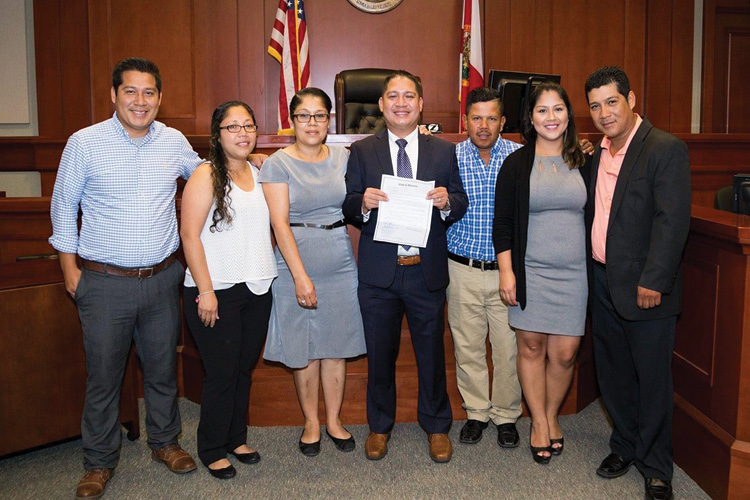From Undocumented to Attorney at Law: A journey of hope and resilience

Photo courtesy of Antonio Jaimes
There was room for only two of us on our tiny raft, yet three of my siblings and I managed to cling onto its surface as my father waded through the Rio Grande, pulling the raft behind him. I was 6 years old when we tackled the river at low tide, when even its deepest points remained shallow enough to stride through. With my father’s torso peeking above the murky water and the sun beginning to peek over the dunes of Texas, we inched closer to our new lives.
Behind us, we left my native land of Mexico, where I was born in a small shack held together with mud, where I had roamed the dirt streets as a toddler completely naked and helped cultivate milpa (maize), seemingly since I was old enough to walk. It was a land that I had seen my parents flee once before, with my mother and two of my brothers safely reaching the States before my father selflessly returned for the rest of us.
In front of us was the promised land: America. It promised an education and a better life. When our raft finally reached the shore of Texas, we just ran. Desperately, we ran and ran. This was the beginning of my new life.
We made it to Florida, where our family reunited after a family friend picked us up and drove us there from Texas. We were fortunate to adjust our legal status under President Ronald Reagan’s Immigration Reform and Control Act of 1986, providing us with a sense of freedom where we no longer had to live in the shadows.
Still, even with our legal status, my siblings and I did not grow up like the typical family in Florida. While we were fortunate to begin our education, there was no such thing as having summer, spring or Christmas breaks—no summer camps or vacations. Instead, we spent those breaks cutting fern (leatherleaf—used as filler for floral arrangements) to help our parents provide food and shelter for a family of nine. We cut fern before and after school during busy seasons like Valentine’s Day and Mother’s Day. We pulled weeds from the fields that grew the fern during the slow seasons.
To help supplement the family’s income, my father started a Mexican band that starred my brothers and me. We played cumbia, ranchera and banda music at birthday parties, quinceañeras, weddings and other social events. I dreaded the hard labor of the fern-cutting most, which included eight to 10 hours of grueling physical work, bending over and over again to cut the fern in either 90-degree heat in the summers or freezing temperatures in the winters. My parents told us, “Hijos, estudien”—which means “get an education”—to avoid ending up doing this type of work for the rest of our lives. And I did just that.
During my senior year of high school, I contemplated what to do after graduation. I knew I did not want to return to those fern fields, so I took it upon myself to strive for something more. That was when a local attorney decided to take a chance on me, and I was introduced to the legal profession and established myself in the community. I assisted the Latino community by offering car rides and translating services to those unable to drive or speak English. Although I did this for free, I did not go unpaid. The satisfaction I gained from helping others was all that I sought, but it ultimately opened up a much larger picture: Helping others is what I was meant to do.
With the desire to help others as my driving force, I obtained a bachelor’s degree and applied to law school. I was the first in my family to acquire a college degree, and going to law school was unheard of in the local Mexican community. Law school was difficult, but with hard work, perseverance and the core values that I learned during those cutting-fern days, I persisted through the rigorous studies. I was able to graduate in 2½ years and passed the Florida bar on the first try—by far one of the greatest achievements in my life.
I am currently the chief legal officer for Laura E. Roth, clerk of the circuit court for Volusia County, Florida. I oversee the clerk’s legal compliance, ranging from employment matters to the statutory duties of the criminal, family, civil and probate departments. Exposure to these different areas of the law equipped me with the experience to help my local Mexican community in my spare time—the community that valiantly supported me throughout my endeavors. I am known as “el abogado,” or “the lawyer,” and I assist those in my community who need guidance. Whether explaining the basic concepts of a court hearing or assisting someone logging into a Zoom hearing, I am here to help. I also mentor Latino youths and encourage them to pursue higher education.
When I look back on my life, I never would have thought the little boy who roamed the dirt streets of Mexico would become an attorney. Now I’d like to pay it forward, helping as many people as possible and giving others the same chances afforded to me so they too could one day lift up someone else.
MyPathtoLaw is a guest column that celebrates the diversity of the legal profession through attorneys' first-person stories detailing their unique and inspiring trajectories.
Antonio Jaimes is the chief legal officer for Laura E. Roth, clerk of the circuit court for Volusia County, Florida. Jaimes earned a bachelor's degree at the University of Central Florida and a JD from the Florida Agricultural and Mechanical University College of Law.
This column reflects the opinions of the author and not necessarily the views of the ABA Journal—or the American Bar Association.



